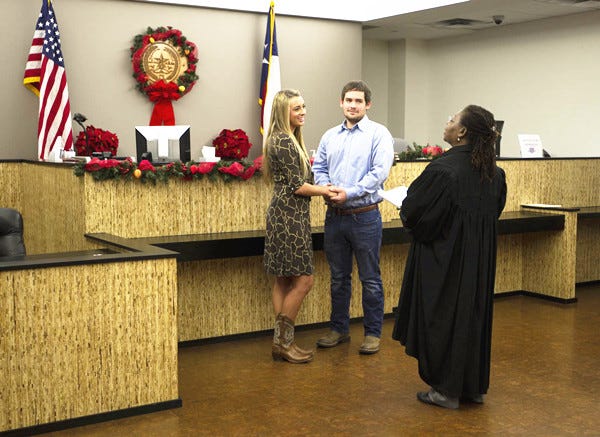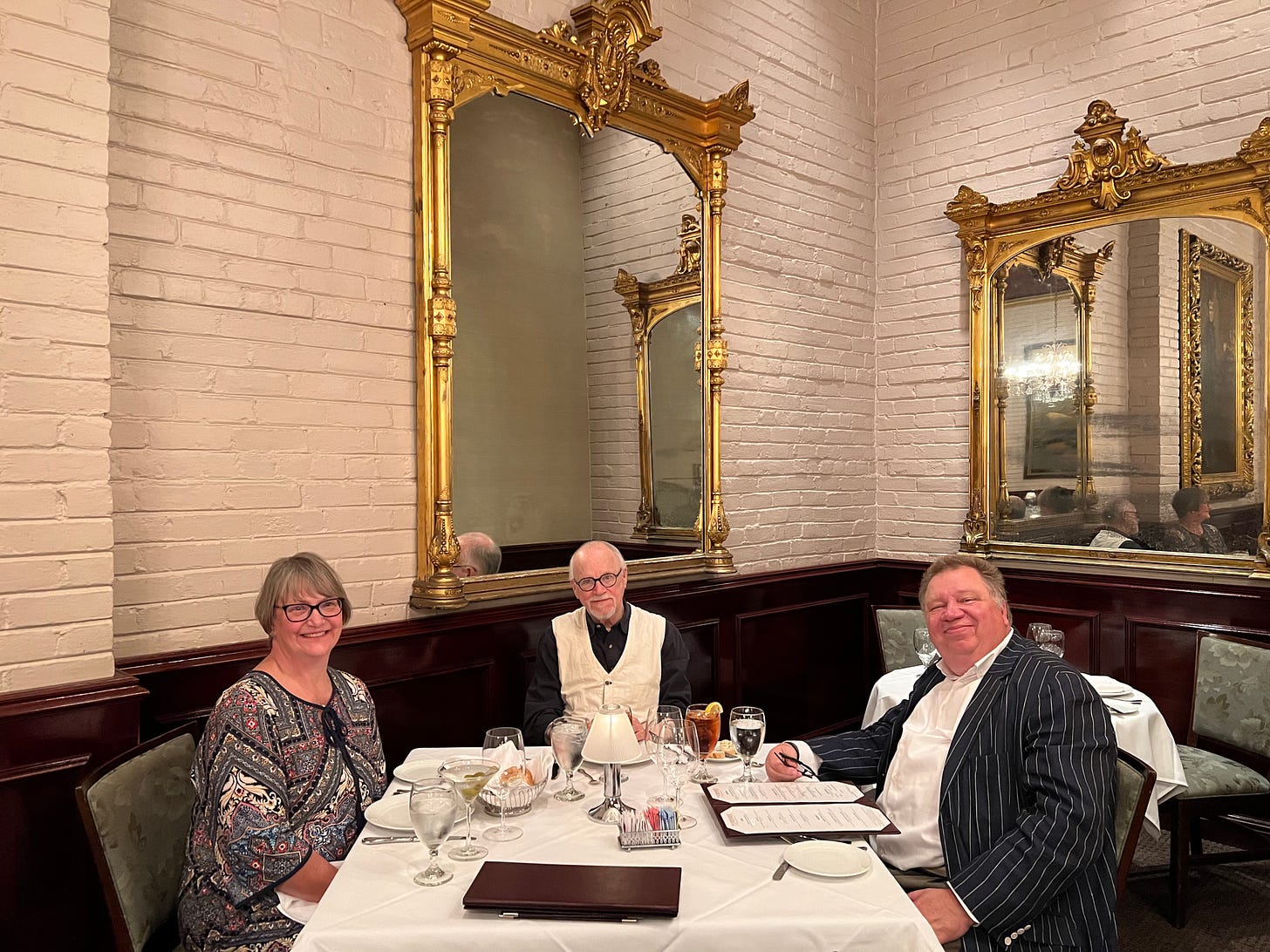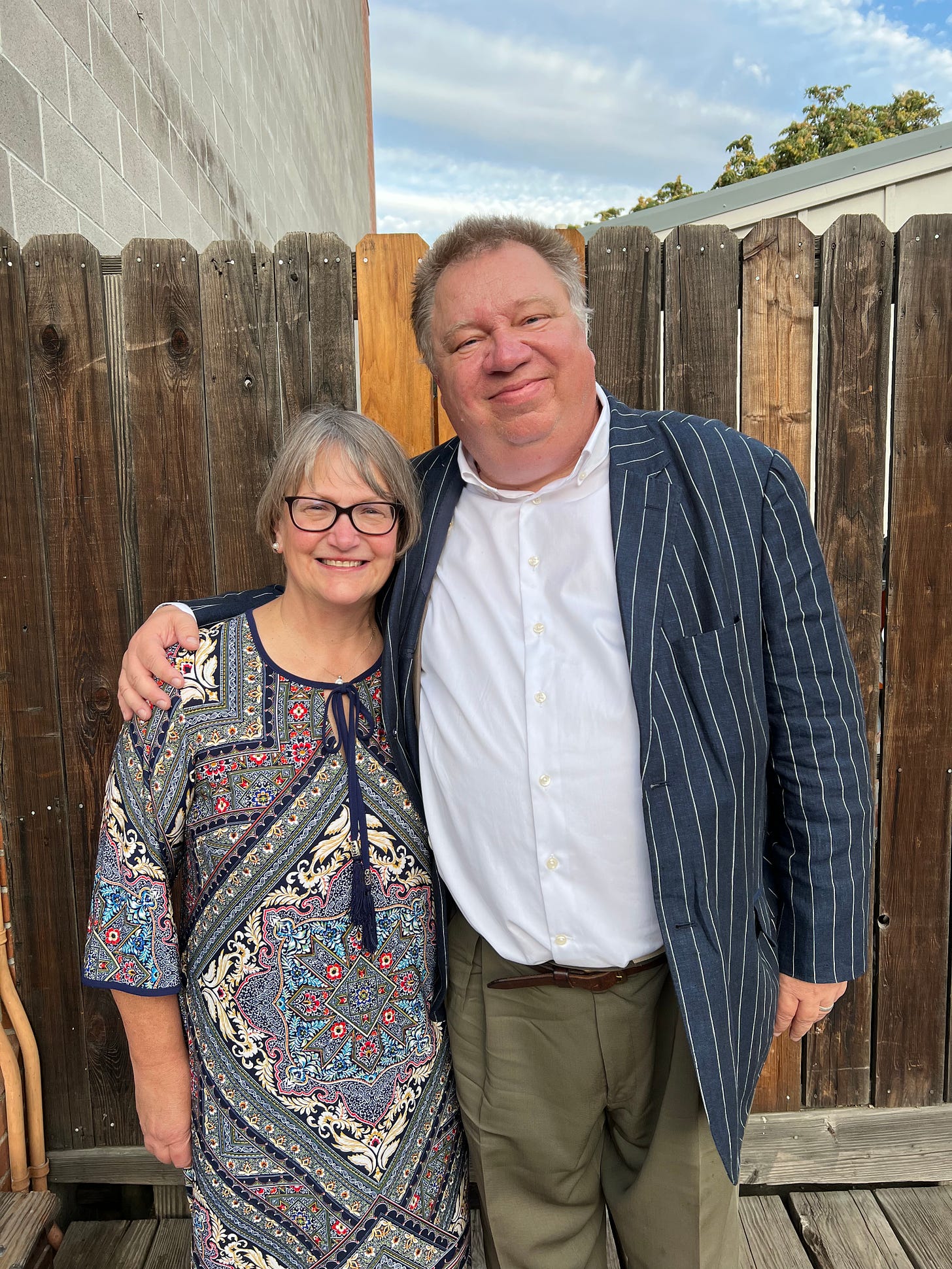
Marriage Is Not Christian
Reducing marriage to a Christian institution might seem pious, but it’s not God- or Bible-honoring.
Dear friends and supporters:
I’m writing about marriage this month. Last week I tackled “In Praise of Marrying Young.” Next week I hope to address “Hedonistic Infertility Versus Creational Fruitfulness.” These topics are controversial. They shouldn’t be.
The title this week is neither clickbait nor a rhetorical bait-and-switch. It is precisely accurate. Marriage is not Christian. But to avoid creating confusion, I instantly must elaborate.
I don’t mean that marriage should not be Christian (of course it should). I don’t mean that marriage isn’t redeemed, elevated, and sanctified by Jesus Christ (of course it is). I don’t mean Christians shouldn’t work everywhere to help make more marriages Christian and marriages more Christian (of course they should). I don’t mean culture can be Christianized without more Christian marriages (of course it can’t).
Rather, I mean that marriage is not a Christian institution. Didn’t start as one. Never will be one.
Marriage is a creational institution, a creational norm. We learn this right in Genesis 1, where it’s one of the three crowning acts of creation: (1) God’s creation of everything in six days by the word of his power; (2) his creation of man as male and female in his image; and (3) his creation of marriage as the foundational earthly institution. “The history of the human race began with a wedding” (Herman Bavinck). While it’s obviously possible to be human and God-honoring without being married, marriage is the default design plan for humanity. It’s a critical part of the cosmic OS.
The Pre-Fall Institution
In fact, marriage is the only divinely established pre-Fall institution. The two other all-important divine institutions, the church and the state, are post-Fall institutions. The church is a redemptive, post-Fall institution, and the state is a non-redemptive, post-Fall institution. (We have a name for a state that attempts to be redemptive: an ideological totalitarianism.)
Jesus confirms marriage as a creational institution (Matthew 19:4). So does Paul (1 Timothy 2:13–14). So, by implication, does Peter (1 Peter 3:7). Marriage did not come about as a result of the earthly ministry of Jesus Christ, of Christianity, or the church, and, while I noted above, the gospel gloriously redeems marriage in our fallen world, it does not alter the institution. It changes the direction of marriage, but it does not reengineer its structure. (On the vital distinction between structure and direction, see Al Wolters’ Creation Regained.)
Misunderstanding Ephesians 5
This truth is obscured for many Christians because they misunderstand biblical texts like Ephesians 5, in which Paul posits a striking analogy between the relation of the husband to the wife and Christ to the church. They seem to think Paul means creational marriage is the antitype of the intimate Christ-church relation. In fact, Geoffrey W. Bromiley’s otherwise helpful book on marriage, while discussing God’s election of sinners to salvation, includes this statement:
The concern for marriage derives both primarily and finally from a concern for Christ’s relation to his people.
This has things precisely backwards, and I’m not sure what he thinks about all the marriages of non-elect unbelievers. Is God “primarily and finally” concerned about only the marriages of the elect? By no means.
In Ephesians Paul is laying out good order in the church (chs. 5–6): order between husbands and wives, parents and children, and masters and servants. He shows how basic the husband-wife relationship is by drawing the analogy between it and Christ and the church. The church‘s marriage to Christ is so intimate precisely because it mirrors the intimacy of creational marriage. In verse 5:32, he refers to a mystery. By “mystery” he means something previously unknown but now revealed. What is this marital mystery?
There’s nothing previously unknown about creational marriage. Everybody understands it, at least in its basic form. But the idea that the church would be intimately related to Jesus Christ in a sense analogous to the relation of a husband and a wife — that, indeed, is a truth hidden that Paul was finally disclosing. The intimacy of Christ and his church is the mystery. The intimacy of creational marriage is not. Creational marriage is fundamental, and ecclesial marriage is derivative.
Marriage is a creational institution, not a Christian, ecclesial or political institution.
Ecclesiasticized Marriage
The patristic church began to drift from this creational understanding of marriage as it capitulated to ecclesiasticism: the tapering of the Faith and kingdom to the church, notably the institutional church, and within the institutional church, to the cultus-liturgical Sunday worship element (what goes on Sunday mornings). The church came to dominate the Faith, but the Faith no longer dominated the church. You can read about this development in Michael W. Kelley’s gem The Impulse of Power.
By the time of the Council of Trent, the Roman church came to demand that only priests could perform weddings:
If any one saith, that matrimonial causes do not belong to ecclesiastical judges; let him be anathema.
Reformational Marriage
In sharp contrast, the Reformers started to recover the idea of marriage as a creational institution. The most consistent in this regard were a number of the Puritans, who went so far as to believe that formally solemnizing marriage was a civil and not an ecclesiastical affair, and cut the church off entirely from the marriage covenant-making. They avoided church weddings.
I think in this move they overreacted (as in a few other matters), but at least they understood that marriage is a creational institution that predates Christianity and the church. To be pre-redemptive is not to be pre-biblical. God’s verbal revelation predated the Fall, and though all Christianity should be biblical, God’s verbal revelation spans creation to consummation. God’s verbal (and now written) revelation must govern all of life — not just the church, but marriage and the family and the state also.
Our broad thinking about life doesn’t just shape our view of human sexuality. Our view of human sexuality shapes the rest of our thinking. Western society’s sexual views and practices over the last few decades haven’t changed so dramatically only because the prominent worldview of our society has changed; our society has changed because its sexual worldview has changed.
This book is about why and how that change came about, how injurious it has been to our culture, and what Christians can do to reverse it. A distinctively Christian strategy for reversing the sexual revolution and its worldview is a restoration of a full-orbed, biblical faith in every aspect of thought and life.
Get the book here.
Marriage Ceremonies in the Bible
Therefore, we Protestants want the Bible to shape our views of marriage, but, notably, no marriage ceremony in the Bible ever occurred in the church or by clergy. They were family arrangements recognized by the state, which in a fallen world has a great interest in the social cohesion only intact marriages can produce. Jesus sanctioned such a wedding by attending it. I’m not suggesting church ceremonies are contra-biblical, only that they have no obvious biblical precedent. Marriage is principally a family function recognized and enforced by (though never originated by) the state.
Two Important Implications
At least two important implications germane for our own time emerge from the truth that marriage is a creational institution.
Marriage Is an Intrinsic Good
First, marriage is a good in itself, and must not be restructured by any other factors, including Christianity. Christianity improves the direction of fallen marriages (and all are). It does not improve the structure of creational marriage, because there’s nothing to improve. God made it very good in the first place.
Because marriage is institutionally good, it is good even for non-Christians to marry. While the Christian minister should not perform a ceremony between a professing non-Christian and professing Christian (1 Corinthians 7:39), nothing forbids Christian ministers from performing a wedding ceremony between two non-Christians. In fact, we need precisely more of this practice to provide an opportunity to witness to the creational dimension of marriage to non-believers.
Recently a friend wrote the following:
Hello Andrew, hub and I both enjoy your posts and respect your theological perspective, I wanted run something by you.... I have a sort of close family member getting married in an Islamic ceremony next month, what is your view on wether or not a Christian should attend such a ceremony?
After she responded affirming both bride and groom were Islamic, I rejoined;
Then, all other things being equal, I do not believe it would be wrong to attend. The reason for this is that marriage is not an inherently Christian institution. It’s a creational institution. It would be wrong to go to a ceremony in which a Christian was marrying a Muslim. But it is not inherently sinful for two Muslims to marry. Marriage is good, even for Muslims.
If marriage as an institution is not Christian, it certainly isn’t Islamic!
How the West Lost God
Marriage is good in itself. The fascinating thesis of How the West Really Lost God by Mary Eberstadt is that secularization occurred because the family eroded; the family didn’t erode because the West secularized. This thesis is difficult to prove (and for that matter refute) because pinpointing social causation is notoriously complex, but there’s no doubt that marriage and the family as creational institutions bolster the God-created cosmos and that any erosion of either leads away from and never toward God. Getting married is a cosmos-conforming, God-glorifying act, even when practiced by unbelievers — and they benefit from it and are drawn closer to him in getting married.
“Gospel-Centered” Marriage Is Insufficient
Second, the “cross-” and “gospel-centered” churches are at a distinct disadvantage in countering uniquely modern assaults like gay “marriage.” They accurately recognize that the gospel is the heart of the Christian Faith, but they fail to recognize that the Bible is wider than the gospel, certainly a gospel that is defined as Christ’s redemptive work designed to rescue individual sinners, justify them, and grant them eternal life. (See “Gospel or Salvation?”)
The biblical worldview is creation–fall–redemption, but many of the “gospel-centered” churches often have only the vaguest sense of the Bible’s creational worldview, and reduce redemption to individual soteriology. The Fall impaired the direction of creation, not its structure, and redemption doesn’t reengineer creation, but, rather, sanctifies, elevates, and restores creation (see Brian G. Mattson’s Cultural Amnesia: Three Essays on Two Kingdoms Theology). Modern attacks on marriage are only indirect attacks on Jesus Christ and the gospel. They’re frontal attacks on something even more fundamental — God’s creational cosmic order. These attacks on marriage are cosmic insurrection that can, to be sure, definitively and finally be overturned only by the gospel of Jesus Christ. Why? Because the gospel is the restoration, elevation, and sanctification of marriage.
Conclusion
Reducing marriage to a Christian institution might seem pious, but it’s not God- or Bible-honoring, and it unnecessarily narrows the ground on which marriage can be defended and championed in our age of cosmos-wreckers. That ground is God’s creational order, which is the only theater in which Jesus Christ’s inexpressible work of redemption can be — and has been, or ever could be — performed.
Will you consider a tax-deductible donation to CCL via PayPal or Venmo? Or mail a check to CCL, Box 100, Coulterville, CA 95311. God uses you to keep us going — and expanding.
Personal
Sharon and I returned from a quick 40th anniversary trip to Bridgeport in the Eastern Sierra. We’d already celebrated our anniversary and my 60th birthday with my father at the classic Firehouse Restaurant in Old Sacramento.
This summer was the busiest of our busiest summers. The lecture travels were exhausting but rewarding. I’m facing the reality of decreasing energy and stamina at just the time CCL is expanding and the travel demands increasing. So I urge you to pray for Sharon and me as we navigate these unprecedented (to us) waters.
I am grateful for each of you. If you’re not a CCL donor, would you consider donating today? CCL is unique in its combination of biblical, orthodox, uncompromising, mature, intelligent, reasoned, gracious claims for Christian culture. If that’s the kind of worldview ministry you find appealing, why not donate today?
Yours for creational marriage,
Founder & President, Center for Cultural Leadership
Get the book here.
More great stuff:
The Center for Cultural Leadership site is here.
My Amazon author page (print and digital) is here.
You can find my sermons and lectures at my YouTube channel.
Sign up to get my blog updates here.
Here’s my Twitter feed.
If you want to get the free exclusive hard copy publication Christian Culture, please send me a Facebook private message.
The CCL phone number is 831-420-7230.
The mailing address is:
Center for Cultural Leadership
P. O. Box 100
Coulterville, CA 95311
















Dear Andrew,
Thank you for kindly supplying, what amounts to me at least, the most elucidating of literary works of the kind that which efficaciously shines a lucid light in the oft-deemed tenebrous & muddy field of our shared Faith, life itself, & of course this temporal bowl of existentialism.
Sourcing reliable, trustworthy, knowledgeable, wise, Scriptural-based, advice & truth - outside of the Scriptures themselves - has proven to be a difficult mortal assignment for yours truly. So I am most grateful for all of your righteous fruits that eminate from your site, do please keep those weekly posts coming. Indeed, our Father has you walking along quite a special pathway in this life, and He has you labouring in an all-encapsulating, sometimes most interested, harvest field.
I too became a sexigenerian this year so I can empathise with your corporeal plight as your time becomes more in demand and constrained, whilst the bones evermore achy, the mind oft fatigued, & physically more weary.
Marriage is indeed a good-blessed, righteous-spirit building, institution that's pro bono omnium for whover enter in upon it. Thanks be to God.
Pearl Gray.